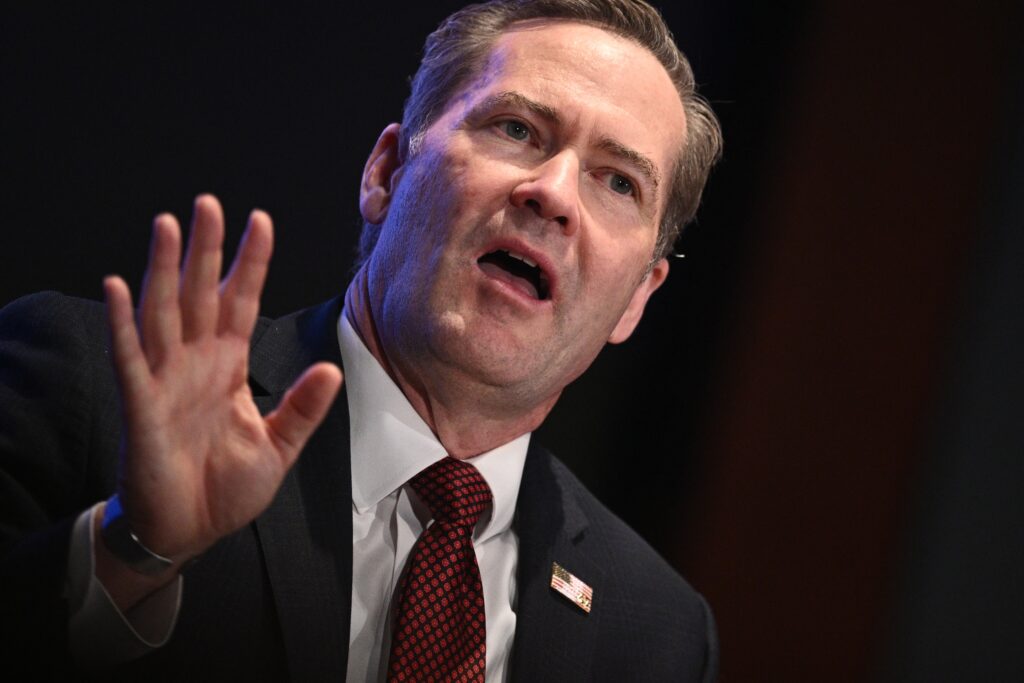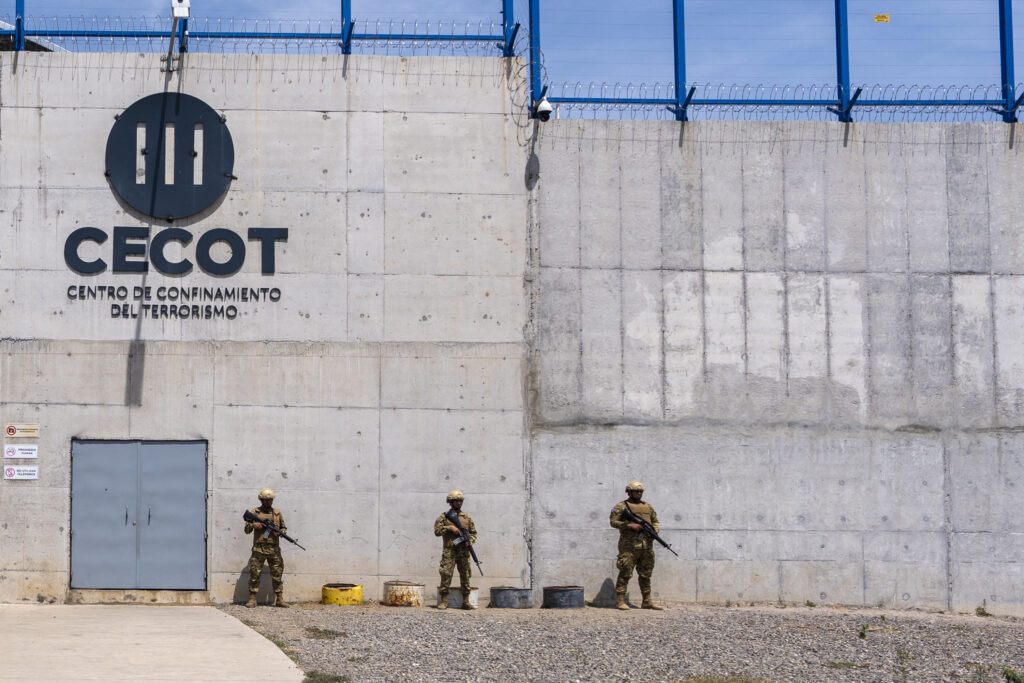Top Trump security official replaced after chat group scandal
US President Donald Trump confirmed Thursday that he was replacing his national security advisor Mike Waltz following a chat group leak, saying he planned to move him to the United Nations.In the first major cabinet shake-up of Trump’s new term, the president said Secretary of State Marco Rubio would now also serve as his “interim” national security advisor following Waltz’s departure.”I am pleased to announce that I will be nominating Mike Waltz to be the next United States Ambassador to the United Nations,” Trump said on Truth Social, confirming earlier reports that Waltz was being ousted.”Mike Waltz has worked hard to put our Nation’s Interests first. I know he will do the same in his new role.”Trump did not give a reason for the move but Waltz had been under pressure over the so-called “Signalgate” scandal since late March.The editor-in-chief of The Atlantic magazine revealed at the time that Waltz had mistakenly added him to a group chat about US strikes on Yemen’s Huthi rebels on the commercial messaging app Signal.Officials on the group laid out the attack plan, including the timings that US warplanes would take off to bomb targets, with the first texts barely half an hour before they launched.Despite intense media speculation that Trump would fire Waltz over the scandal, the president repeatedly offered his backing and the national security advisor appeared to have ridden out the storm.In the end, however, the 51-year-old former congressman from Florida lasted just over 100 days of Trump’s second term, which has so far been more stable in terms of personnel than his first.Democrats will now turn up the heat on Defense Secretary Pete Hegseth, who was the official who revealed the air strike details in advance, and who was also reported to have shared those details in a separate Signal group chat that included, among others, his spouse.”Now do Hegseth,” top Senate Democrat Chuck Schumer posted on X.Waltz’s new role will also require Senate confirmation, ensuring that Signalgate will stay in the headlines.There was no immediate confirmation of US media reports that Waltz’s deputy, Alex Wong, would also leave the National Security Council.US media had reported that Steve Witkoff, a real estate magnate whom Trump has picked to lead US talks with both Russia and Iran, is in contention to replace Waltz in the longer term.- ‘SCALP’ -Waltz was among a number of White House staff targeted by right-wing influencer and conspiracy theorist Laura Loomer, who met with Trump urging a purge.Loomer, who is known for claiming that the September 11, 2001, attacks were an inside job, is reported to have successfully pushed for the dismissal of several senior US security officials she deemed disloyal to the president.After news of Waltz’s ouster was reported Thursday, Loomer appeared to take credit in a post on X, saying: “SCALP.”Waltz showed no sign that he knew of his imminent departure when appearing early Wednesday on Fox News, where he hailed the new US minerals deal with Ukraine.Waltz was also present at Trump’s televised cabinet meeting on Wednesday when he lavished praise on the president.”We’ve had 100 days of your leadership with respect, with strength,” Waltz said. “It’s an honor to serve you in this administration.”A former special forces officer, Waltz was seen as a moderate voice in the Trump administration when he was appointed, but reportedly clashed with other officials over his hawkish stance against Russia and Iran.Trump has pushed for Ukraine to reach a quick ceasefire deal with Russia, while reopening negotiations with Iran over its nuclear program.The National Security Advisor’s role has been held in the past by some of the most high-profile officials in US history, including Henry Kissinger.But Waltz had been on borrowed time since Signalgate emerged as the first major scandal of the whirlwind start of Trump’s new term.On the text chain, Waltz sent real-time intelligence on the aftermath of an attack on the Huthis, writing that US forces had identified the target “walking into his girlfriend’s building and it’s now collapsed.”Hegseth revealed detailed timings of the US airstrikes on Yemen, putting him squarely in the Democrats’ crosshairs.
Trump use of wartime law for deportations ‘unlawful’: judge
A federal judge in Texas ruled on Thursday that President Donald Trump’s use of an obscure wartime law to summarily deport alleged Venezuelan gang members was “unlawful.”District Judge Fernando Rodriguez, a Trump appointee, blocked any deportations from his southern Texas district of alleged members of the Tren de Aragua (TdA) gang using the 1798 Alien Enemies Act (AEA).Trump invoked the little-known AEA, which was last used to round up Japanese-American citizens during World War II, on March 15 and flew two planeloads of alleged TdA members to El Salvador’s notorious maximum security CECOT prison.In a proclamation, Trump said Tren de Aragua was engaged in “hostile actions” and “threatening an invasion or predatory incursion against the territory of the United States,” adding that Venezuela’s Nicolas Maduro was pulling the strings.The Supreme Court and several district courts have temporarily halted removals under the AEA citing a lack of due process, but Rodriguez is the first federal judge to find that its use is unlawful.”The president cannot summarily declare that a foreign nation or government has threatened or perpetrated an invasion or predatory incursion of the United States,” the judge said in his 36-page order.”Allowing the president to unilaterally define the conditions when he may invoke the AEA, and then summarily declare that those conditions exist, would remove all limitations to the executive branch’s authority under the AEA,” Rodriguez said.”The president’s invocation of the AEA… exceeds the scope of the statute and, as a result, is unlawful,” the judge said.The administration does not have the lawful authority, under the AEA, “to detain Venezuelan aliens, transfer them within the United States, or remove them from the country,” he added.- ‘Critically important decision’ -Lee Gelernt, an attorney with the American Civil Liberties Union (ACLU), which brought the lawsuit seeking to halt the removals, welcomed the ruling.”The court ruled the president can’t unilaterally declare an invasion of the United States and invoke a wartime authority during peacetime,” Gelernt said.”Congress never meant for this 18th-century wartime law to be used this way,” he said. “This is a critically important decision that prevents more people from being sent to the notorious CECOT prison.”While prohibiting deportations under the AEA, Rodriguez said the administration could proceed with removals under the Immigration and Nationality Act.Trump won the White House election last November in large part on promises to combat what he repeatedly claimed is an invasion of criminal migrants.Trump has sent troops to the Mexican border, imposed tariffs on Mexico and Canada for allegedly not doing enough to stop illegal crossings, and designated gangs like TdA and MS-13 as terrorist groups.Attorneys for several of the Venezuelans already deported have said their clients were targeted largely on the basis of their tattoos.In the most publicized case to date, Maryland resident Kilmar Abrego Garcia was deported to CECOT before the Trump administration admitted he was sent there due to an “administrative error.”
Record de chaleur au Royaume-Uni pour un 1er mai
Le mercure a grimpé jusqu’à 29,3°C jeudi à Londres, un record au Royaume-Uni pour un 1er mai, après un mois d’avril qui a été le plus ensoleillé dans le pays depuis le début des relevés météo, selon l’Office national de météorologie.Cette température inédite a été enregistrée par le Met Office à Kew Gardens, parc botanique situé dans le sud-ouest de la capitale britannique. Le précédent record datait de 1990 avec 27,4°C atteints dans la ville côtière de Lossiemouth dans le nord de l’Ecosse.Ce 1er mai est aussi la plus chaude journée depuis le début de l’année dans le pays.Comme d’autres pays européens, le Royaume-Uni connaît depuis le début de la semaine une vague de chaleur particulièrement importante.Selon les premières estimations du Met Office, le mois d’avril écoulé a été le plus ensoleillé depuis le début des relevés météorologiques en 1910, et le troisième plus chaud, avec une température moyenne de 9,6°C.C’est 1,7°C de plus que la moyenne de long terme.Actuellement, “le soleil est aussi fort qu’il l’est habituellement au mois d’août”, a souligné Aidan McGivern, météorologue au Met Office.Cela s’explique par un phénomène de haute pression qui s’est constitué au-dessus du Royaume-Uni durant une grande partie du mois d’avril.”L’air a alors tendance à descendre, à se comprimer et à se réchauffer”, explique Aidan McGivern.Avril a aussi été particulièrement sec, avec près de moitié moins de précipitations que la normale.Avant lui, mars avait également été particulièrement ensoleillé, à tel point que le pays “a connu ses deux premiers mois de printemps les plus chauds (mars et avril)” depuis au moins 1960, selon le Met Office.Ces conditions ont entraîné de nombreux incendies à travers le pays. Jeudi encore, un feu s’est déclenché dans le West Yorkshire (nord de l’Angleterre). Depuis le début de l’année, plus de 400 incendies ont été enregistrés dans le pays, selon le Conseil national des chefs des pompiers, un nombre en forte hausse par rapport aux années précédentes.Plus de 30 hectares de forêts ont brûlé, selon les données du Système d’information sur les incendies de forêt en Europe.Selon les projections du Met Office, “les vagues de chaleur deviendront plus fréquentes à l’avenir, en particulier dans le sud-est du Royaume-Uni, avec des températures qui devraient augmenter en toutes saisons”.Jeudi devrait marquer le pic de la vague de chaleur actuelle, avec des températures qui redescendront largement sous les 20°C dès dimanche, selon les prévisions.
‘We are the people of this land,’ Palestinians mark ‘Nakba’
About 300 Arab Israelis gathered Thursday in the ruins of a village that Palestinians fled during the 1948 war that led to the creation of Israel, to commemorate what Palestinians call the “Nakba”, or catastrophe.As Israel celebrated Independence Day on Thursday, the demonstrators —- men, women, and children -— marched through the ruins chanting, “Your independence is our Nakba”.The place where the demonstrators gathered was previously the village of Al-Lajjun.The site, once home to thousands of Palestinians, has now been partly taken over by kibbutz Megiddo, an Israeli farming community.This year’s remembrance unfolded against the backdrop of the war in Gaza, where more than 18 months of fighting between Israel and Hamas militants have displaced nearly all of the territory’s 2.4 million people at least once, according to the United Nations.Clad in traditional keffiyeh headscarves and garments, marchers sang the Palestinian anthem and shared memories of loss and resilience.Among them was Ziyad Mahajneh, 82, who had fled the village as a child in 1948.They “attacked our village with cannons and machine guns,” Mahajneh recalled.He said when his family fled he was left behind, and it was a neighbour who helped him reunite with them in the nearby town of Umm al-Fahm, now also part of Israel.”Today, we are forbidden to be here. They ask us, ‘What are you doing here’?” he told AFP, referring to Israelis.”Al-Lajjun land has now become kibbutzim.”Memories of displacement echoed through the gathering.During the 1948 war, around 760,000 Palestinians fled or were driven from their homes.The descendants of some 160,000 Palestinians who managed to remain in what became Israel presently make about 20 percent of its population.Many of today’s Arab Israelis remain deeply connected to their historic land.For more than two decades, Arab Israelis have marked Israeli Independence Day with an annual “March of Return” to a depopulated Palestinian village.This year, however, organisers said heightened restrictions imposed by Israeli authorities —- including limits on attendance and a ban on Palestinian flags —- led them to cancel the central march and hold smaller demonstrations instead.”They want us to stop from doing even the simplest act: remembering the Nakba,” said Faisal Mahajneh, another displaced resident of Al-Lajjun.”We are the people of this land, and we will not lose hope” of returning, said Ziyad.



